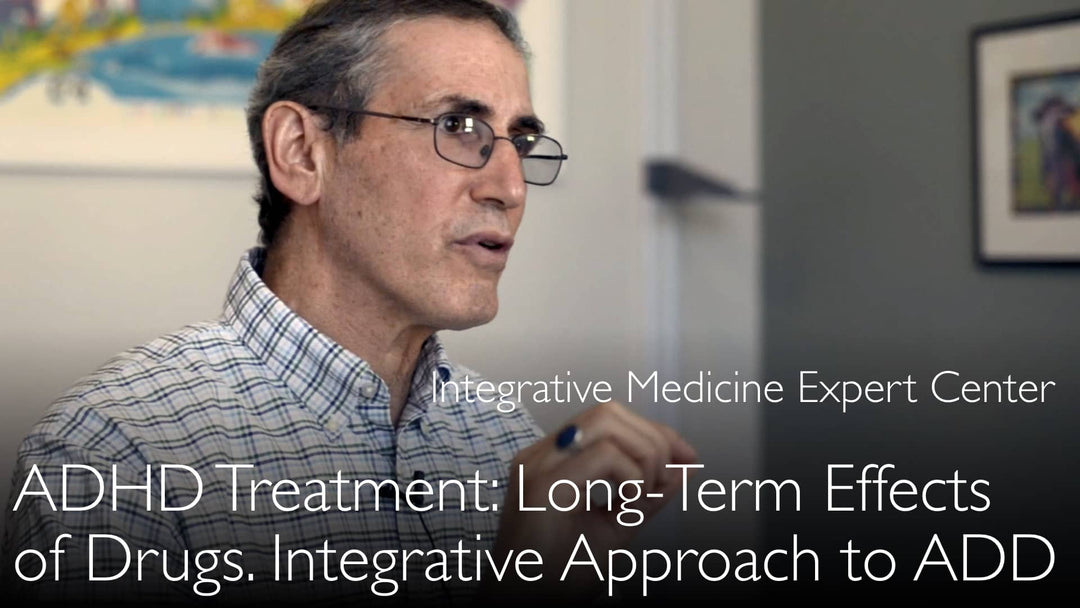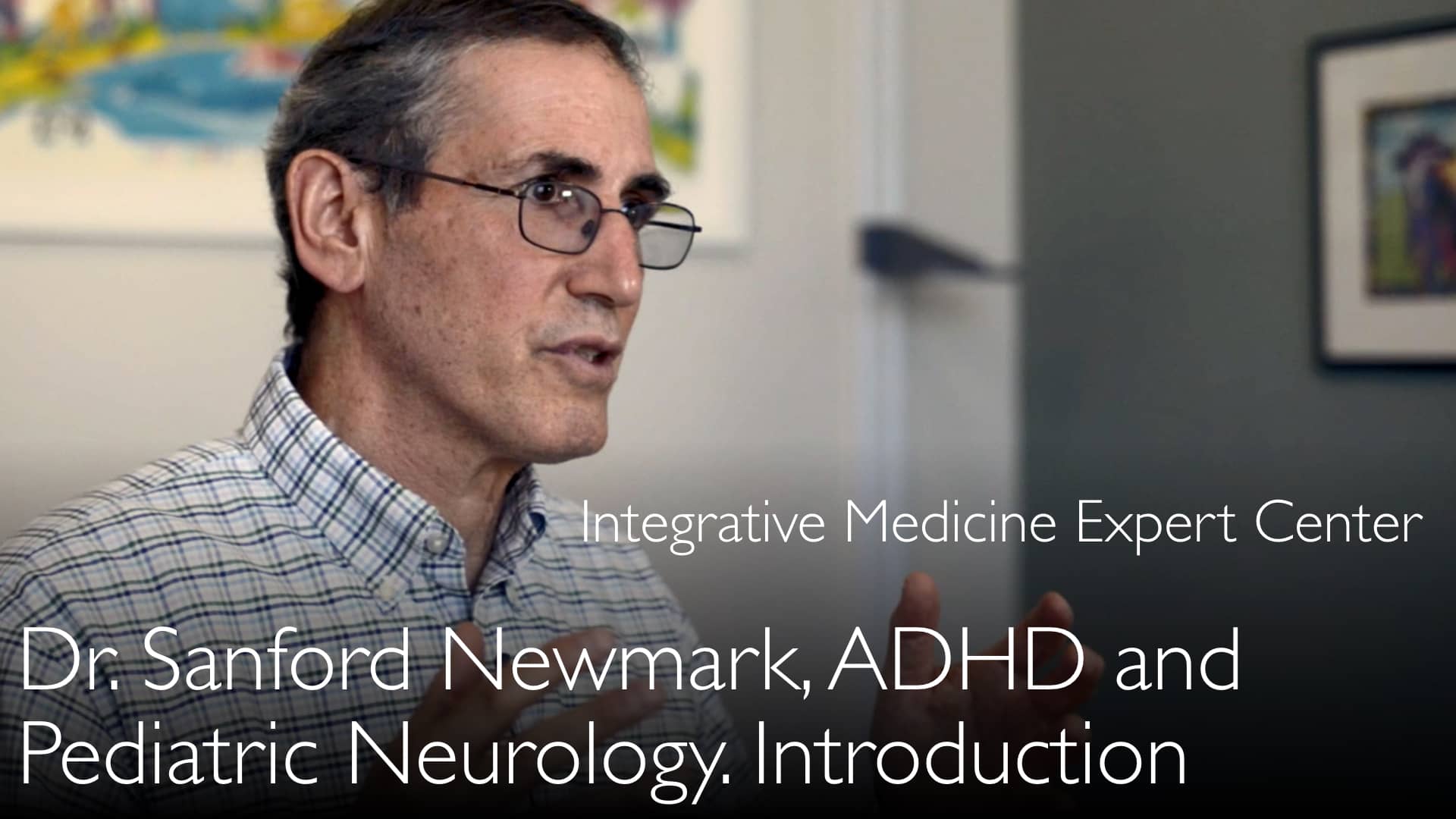Ifølge Dr. Sanford Newmark, MD, en førende ekspert inden for holistisk ADHD-behandling, vokser 30–50 % af børn med ADHD fra deres symptomer uden brug af medicin. Han understreger, at der mangler langtidssundersøgelser af stimulerende ADHD-medicin. Disse lægemidler påvirker hjernens udvikling og balancen af neurotransmittere, og deres subtile, langvarige bivirkninger er stadig i høj grad ukendte. En medicinsk second opinion kan sikre en præcis ADHD-diagnose og hjælpe med at vælge den mest hensigtsmæssige, integrerede behandlingsplan.
Forstå de langsigtede effekter og risici ved ADHD-medicin
Spring til afsnit
- Oversigt over ADHD-medicin
- Korttidsvirkning og sikkerhed
- Bekymringer om langsigtede resultater
- Påvirkning af hjerneudvikling
- Naturlige forløb uden medicin
- Integrativ behandlingstilgang
- Fuld transskription
Oversigt over ADHD-medicin
ADHD-medicin er primært stimulanter, ofte baseret på amfetamin. Ifølge dr. Sanford Newmark, MD, virker disse lægemidler ved at stimulere centralnervesystemet. De er en almindelig behandling, hvor omkring to tredjedele af diagnosticerede patienter får dem. Der findes mange forskellige typer ADHD-medicin, men de fungerer på lignende vis.
I interviewet drøfter dr. Anton Titov, MD, deres udbredte brug. Lægemidlene virker ved at ændre niveauerne af neurotransmittere i hjernen.
Korttidsvirkning og sikkerhed
ADHD-medicin er meget effektive til at kontrollere symptomer på kort sigt. Dr. Sanford Newmark, MD, oplyser, at de virker for omkring 70 % af børn med opmærksomhedsforstyrrelse. Sikkerhedsprofilen for disse lægemidler er også grundigt undersøgt og velkendt på kort sigt.
Dog påpeger dr. Newmark, at medicinen har adskillige bivirkninger. Alligevel kan den give afgørende stabilisering for et barn, der kæmper i skolen eller sociale situationer.
Bekymringer om langsigtede resultater
Der er begrænset dokumentation for den langsigtede effektivitet af ADHD-medicin. Dr. Sanford Newmark, MD, henviser til de få eksisterende langsigtede kliniske studier. Disse viser, at de positive effekter af medicinen synes at aftage over tid.
Dr. Anton Titov, MD, fremhæver, at børn ofte tager medicinen i 5–10 år. Studierne fandt ikke, at medicin fører til bedre skoleresultater eller adfærd på lang sigt. Eksperterne er usikre på årsagen til denne effektnedgang.
Påvirkning af hjerneudvikling
En væsentlig bekymring er, hvordan langvarig brug af ADHD-medicin påvirker hjerneudviklingen. Dr. Sanford Newmark, MD, forklarer, at disse stimulanter ændrer niveauerne af neurotransmittere. Dette påvirker uundgåeligt den udviklende hjernearkitektur hos barnet.
Dr. Newmark understreger, at ingen har undersøgt de subtile, langsigtede bivirkninger af denne påvirkning. Det er ukendt, om ændringen hjælper, skader eller forværrer ADHD over årtier. Potentialet for langsigtede bivirkninger er et kritisk område, der kræver yderligere forskning.
Naturlige forløb uden medicin
Et betydeligt antal børn vokser fra ADHD uden medicin. Dr. Sanford Newmark, MD, oplyser, at 30–50 % af børn med ADHD ikke vil have en diagnosticerbar tilstand som voksne. Denne naturlige udvikling sker uden medicinsk indgriben.
Disse data, drøftet med dr. Anton Titov, MD, antyder, at medicin kan være unødvendig for en stor gruppe. Beslutningen om medicinsk behandling bør afvejes mod barnets aktuelle problemer og funktionsevne.
Integrativ behandlingstilgang
En integrativ tilgang tilbyder et stærkt alternativ eller supplement til medicin. Dr. Sanford Newmark, MD, taler for behandlinger med langsigtede positive effekter og færre bivirkninger. Den bedste terapi for ADHD kombinerer ofte kostændringer, regelmæssig motion og adfærdsændringer.
Dr. Anton Titov, MD, understreger, at en second opinion er afgørende. Den sikrer, at ADHD-diagnosen er korrekt og fuldstændig, før man iværksætter en langsigtet behandling. Denne holistiske strategi adresserer årsagerne og fremmer bæredygtig sundhed.
Fuld transskription
De langsigtede effekter af ADHD-medicin er ikke velundersøgte. Stimulerende medicin påvirker hjerneudviklingen. Der er sandsynligvis subtile, langsigtede bivirkninger ved medicinsk ADHD-behandling. 30–50 % af børn vokser fra ADHD uden medicin.
Men hvilke børn har brug for ADHD-behandling? En førende ekspert i holistisk ADHD-behandling drøfter de langsigtede effekter af ADHD-medicin.
ADHD-medicin påvirker hjerneudviklingen – det ved vi. Halvdelen af børn med ADHD vokser fra det uden medicin.
De langsigtede effekter af ADHD-medicin bør undersøges nærmere. At finde den rigtige medicin kræver en detaljeret vurdering af en ADHD-specialist. Undgå langsigtede bivirkninger af ADHD-medicin.
Forældre bør sikre, at ADHD-diagnosen er korrekt og fuldstændig. Den bedste medicin for ADHD hos børn er en integrativ tilgang. Den bedste terapi for ADHD kombinerer kostændringer, motion og adfærdsændringer.
Dr. Sanford Newmark, MD: Medicin til ADHD er hovedsageligt amfetaminbaserede stoffer, der stimulerer centralnervesystemet. Deres langsigtede bivirkninger er ukendte. Der er ikke foretaget langsigtede kliniske forsøg med bivirkninger af ADHD-medicin.
Langsigtede effekter af ADHD-medicin kan føre til ændringer i hjerneudvikling og -arkitektur.
Dr. Anton Titov, MD: Lad os tale om ADHD-behandling. To tredjedele af patienter med en ADHD-diagnose behandles med medicin. De fleste ADHD-medicin er stimulanter, amfetaminderivater.
Der er nok mindre tvivl om, at ADHD-medicin er effektive på kort sigt. Sikkerhedsprofilen på kort sigt er velundersøgt.
Men hvad med den langsigtede effektivitet? Hvad er de potentielle langsigtede bivirkninger af ADHD-medicin?
Dr. Sanford Newmark, MD: ADHD-medicin er meget effektive på kort sigt. De har mange bivirkninger. Men for nogle børn virker de fint. Medicinen er effektiv for omkring 70 % af børn med opmærksomhedsforstyrrelse.
Man kan se på de få langsigtede kliniske forsøg med ADHD-medicin. Resultaterne er ikke særlig gode. Det ser ikke ud til, at medicinen generelt er særlig nyttig på lang sigt.
Ingen ved helt sikkert hvorfor. Men de tilgængelige data tyder ikke på, at ADHD-medicin fører til bedre skoleresultater eller adfærd.
Vi ved virkelig ikke meget om de langsigtede bivirkninger. Vi ved, at der ikke er dramatiske bivirkninger, fordi børn har brugt medicinen i lang tid – faktisk siden 1950'erne.
Men ingen har undersøgt de subtile bivirkninger. Ingen har undersøgt, hvordan medicinen påvirker hjerneudviklingen. Vi ved, at den gør det.
ADHD-medicin må påvirke hjerneudviklingen, fordi den ændrer niveauerne af neurotransmittere i hjernen. Det er en del af, hvordan hjernen udvikler sig hos disse børn.
Måske hjælper det på lang sigt. Måske forværrer det ADHD. Vi ved det ikke. Langsigtede bivirkninger af ADHD-medicin er noget, vi virkelig bør undersøge.
Dr. Anton Titov, MD: I de langsigtede kliniske forsøg så man et andet resultat. Effekten af ADHD-medicin var i hvert fald svagere. Medicinens effekt aftog med tiden.
Børn tager disse lægemidler i måske 5–10 år. Så vokser de op og bliver voksne. Ved vi noget om, hvad der sker, når børn med ADHD stopper medicinen?
For balancen af neurotransmittere i deres hjerne har været påvirket i et årti eller deromkring. Hvad sker der, hvis man pludseligt stopper eller nedsætter dosis?
Er der udført kliniske forsøg med unge voksne om dette?
Dr. Sanford Newmark, MD: Nej. Hvad vi ved, er dette: Hvis man lader børn med ADHD være uden medicin, vil 30–50 % af dem vokse fra deres ADHD. De vil simpelthen ikke have ADHD som voksne.
De vil ikke have en diagnosticerbar ADHD. De kan have visse tendenser. Nogle mennesker er roligere, andre mere aktive. Nogle er organiserede, andre uorganiserede.
Men 30–50 % af børn vokser fra ADHD.
Dr. Anton Titov, MD: Uden medicin?
Dr. Sanford Newmark, MD: Ja.
Dr. Anton Titov, MD: Det er et meget stort antal.
Dr. Sanford Newmark, MD: Det er et stort antal.
Dr. Anton Titov, MD: At medicinere næsten halvdelen af børnene, der legitimt har ADHD, kan være unødvendigt.
Dr. Sanford Newmark, MD: Det kan det, men det afhænger af, hvor meget de lider på grund af deres ADHD. Jeg bruger medicin. Jeg vil ikke fremstå som modstander af medicinsk ADHD-behandling.
Nogle gange har man et barn, der fejler i skolen, har et forfærdeligt socialliv, og hjemmet er i oprør på grund af deres adfærd.
Så har man virkelig brug for at bruge medicin til at stabilisere tingene, så barnet kan have succes – selvom de måske vokser fra ADHD senere.
Vi har ikke undersøgt dette. Men mit gæt er, at børn med mere alvorlig ADHD er dem, der alligevel ikke vil vokse fra det.
Men man ved det ikke. Der er en rolle for medicin til ADHD. Men der er også en større rolle for andre behandlinger, der kan have en langsigtet positiv effekt uden bivirkninger.





